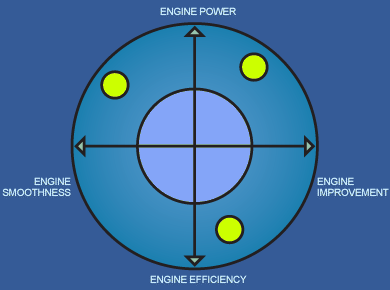The
Ignition System Challenge
With the universality of internal combustion engines, their
impact on the environment and fuel consumption receives constant
serious attention. Engine designers and manufacturers are challenged
to continuously and cost-effectively meet demands to improve
fuel efficiency and reduce emissions, without compromising
performance.
 Reduce emissions while improving fuel efficiency, under all operational and atmospheric
conditions
Reduce emissions while improving fuel efficiency, under all operational and atmospheric
conditions
 Simultaneously increase power output while maintaining fuel efficiency
Simultaneously increase power output while maintaining fuel efficiency
 Deliver increased power while maintaining smooth and reliable operations under
all operating conditions.
Deliver increased power while maintaining smooth and reliable operations under
all operating conditions.
A
large part of the challenge in developing these cost-effective
solutions is that many of the new requirements fall outside
the capabilities of current ignition
systems.
For engine manufacturers to develop
solutions using current ignition systems, requirements must
be moved
to fall within the current limits. This is accomplished by
expanding the capabilities of other engine sub-systems or functionalities,
which is expensive to develop and manufacture. For example,
regulations being enacted over the next decade will require
a substantial reduction in permissible tailpipe emissions.
However, it is expensive to meet these requirements within
the limits of today’s engine combustion process.
The
KSI Solution
Knite’s Knite Spark Ignition™ (KSI™)
system improves overall engine performance by improving the
combustion
process. This results in:
 improved
fuel efficiency
improved
fuel efficiency
 reduced
emissions
reduced
emissions
 greater
performance
greater
performance
 smoother
engine operation.
smoother
engine operation.
The
KSI system generates a moving spark that is 100x larger than
a conventional spark. This creates a faster and
more thorough combustion event which results
in an expansion of the boundaries of the engine’s capability (tuning
range). With the limitations of the ignition system removed, engine designers
and manufacturers
can cost-effectively meet the increasingly challenging requirements being
placed on engines. It is no longer the case that meeting one set of requirements
comes
at the expense of others. The KSI system is the solution that produces internal
combustion engines that can be made more fuel-efficient, environmentally-friendlier,
and more powerful.
KSI™ BENEFITS |
 |
KSI
expands the capabilities of ignition systems, enabling
manufacturers to cost-effectively meet new requirements. |
The
KSI System can be easily adopted by current Spark Ignition
engines without major engine modification. |
KSI
is an enabler for other engine advances such as GDI,
lean burn, EGR, alternative fuels. |
Benefits
of KSI:
Improved
fuel efficiency
 The
substantially larger spark produces a quicker, more complete
combustion enabling the engine to operate at significantly
leaner mixtures.
The
substantially larger spark produces a quicker, more complete
combustion enabling the engine to operate at significantly
leaner mixtures.
Reduced
combustion emissions
 Faster
and more complete combustion lowers harmful emissions.
KSI reduces the need to use expensive and complicated
solutions to meet increasingly stringent emission standards.
Faster
and more complete combustion lowers harmful emissions.
KSI reduces the need to use expensive and complicated
solutions to meet increasingly stringent emission standards.
Can be retrofitted into existing engines
 KSI
is a direct replacement for conventional ignition systems.
KSI spark plugs have the same thread pitch
and diameter as conventional plugs. KSI aftermarket
solutions can be developed to enable retrofit engines. Because the amount
of energy required to fire KSI and conventional plugs
is similar, a KSI installation
can use the charging portion of the engine’s original ignition
system.
KSI
is a direct replacement for conventional ignition systems.
KSI spark plugs have the same thread pitch
and diameter as conventional plugs. KSI aftermarket
solutions can be developed to enable retrofit engines. Because the amount
of energy required to fire KSI and conventional plugs
is similar, a KSI installation
can use the charging portion of the engine’s original ignition
system.
Cost
effective solution
 An
engine can be converted to KSI for a fraction of the
cost of other modifications that would be needed to achieve
similar improvements
An
engine can be converted to KSI for a fraction of the
cost of other modifications that would be needed to achieve
similar improvements
As application to most engine markets
 KSI is compatible with the size limitations and operational characteristics of
automobiles, smaller recreational vehicles such as outboard motors, personal
water craft (PWC), snowmobiles, and two-wheel vehicles such as motorcycles
and scooters. KSI is beneficial on both 2-stroke and 4-stroke engines.
KSI is compatible with the size limitations and operational characteristics of
automobiles, smaller recreational vehicles such as outboard motors, personal
water craft (PWC), snowmobiles, and two-wheel vehicles such as motorcycles
and scooters. KSI is beneficial on both 2-stroke and 4-stroke engines.
An
enabling technology for other internal combustion engine
technologies.
 KSI
solves implementation problems facing Gasoline Direct
Injection and other new engine technologies
KSI
solves implementation problems facing Gasoline Direct
Injection and other new engine technologies
 KSI
improves the performance of Gasoline Direct Injection
(GDI), Exhaust Gas Re-circulation (EGR) and alternative
fuels.
KSI
improves the performance of Gasoline Direct Injection
(GDI), Exhaust Gas Re-circulation (EGR) and alternative
fuels.